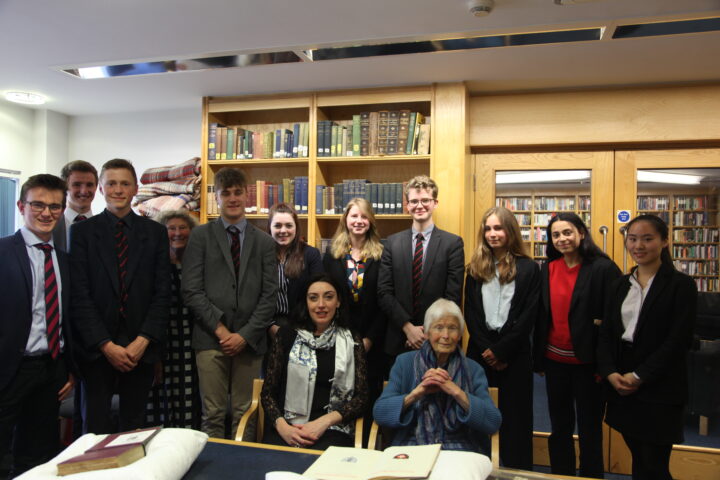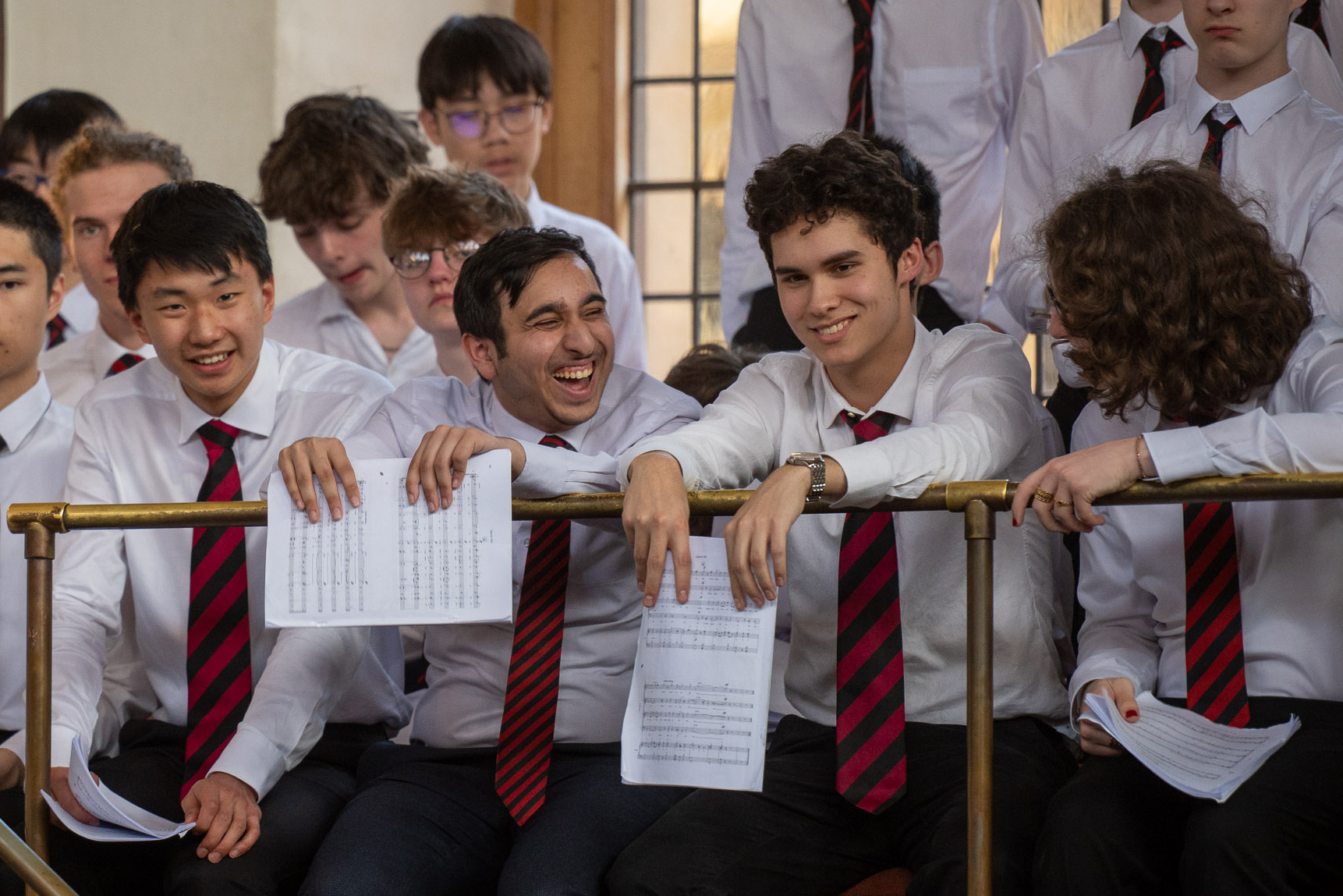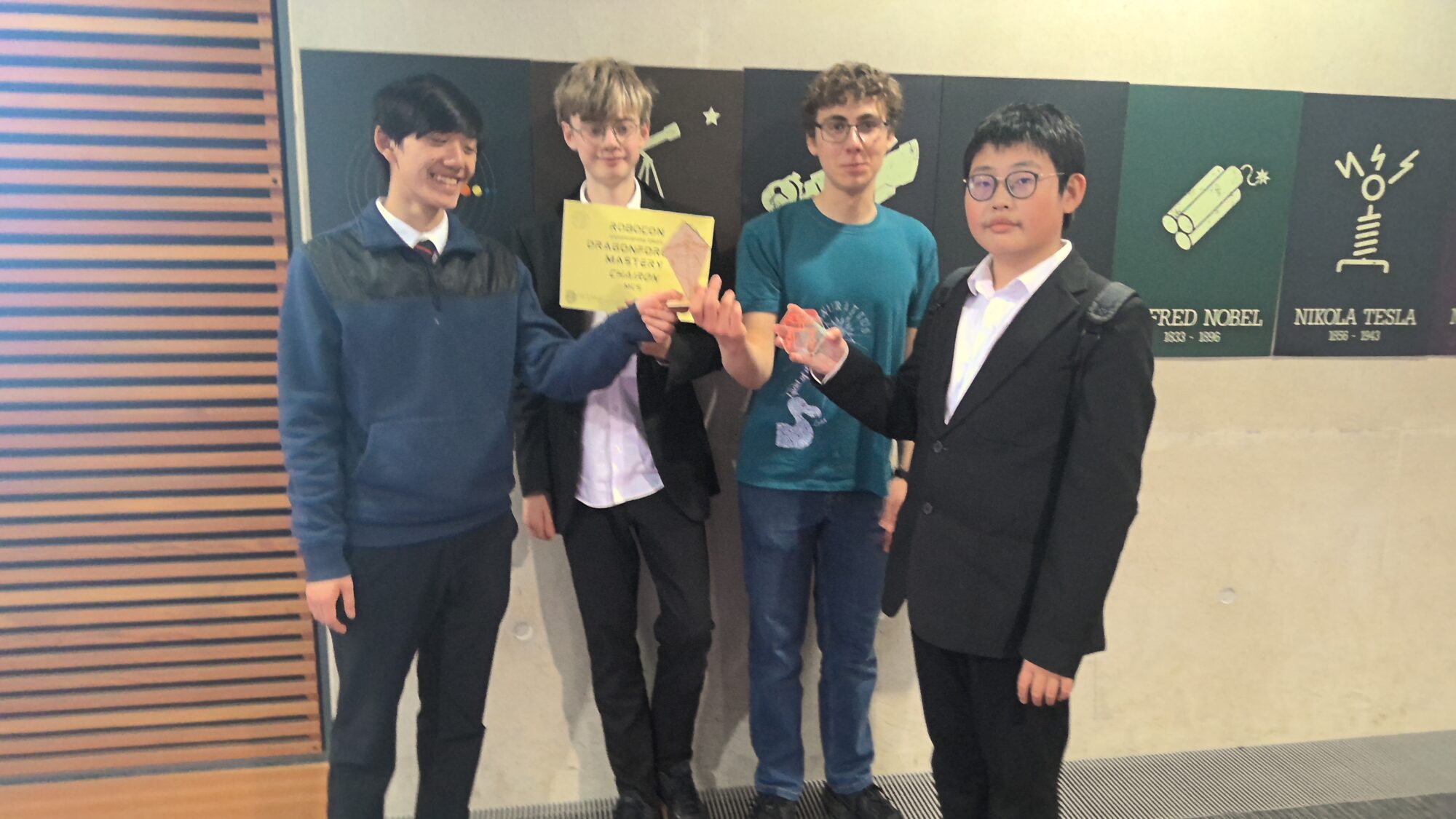
(14 November 1923 – 14 January 2024)
Corinna is pictured front right next to Master Helen Pike and with Sixth Formers on a visit the MCS Archive in 2019.
The Waynflete Office has been informed of the death of Corinna Wiltshire at the age of 100.
Corinna was the daughter of Sir Basil Blackwell OW, former Chair of Governors and benefactor to MCS. She was the granddaughter of Benjamin Henry Blackwell, founder in 1879 of the famous Oxford bookshop which went on to become the Blackwell family’s publishing and bookshop empire.
Corinna was always a great supporter of MCS and particularly enjoyed visiting school and meeting pupils and was a huge supporter of girls being admitted into the Sixth Form. She and her brother Julian Blackwell encouraged the creation of the Blackwell’s History Conference which takes place each year at MCS. The following is based on an interview with Corinna just before her 90th birthday and is also a summation of conversations over many years. We are grateful to Rita Ricketts, archivist for the Blackwell family for providing it.
Given that both Corinna’s parents were classicists, her name is no surprise; her elder sisters were named Helen and Penelope, Corinna, or Korinna, an ancient Greek poet, allegedly taught her rival, the better-known Theban poet, Pindar. Corinna (Blackwell) was always teacherly, and a scholar, albeit manque. Like her ancient namesake, Corinna nurtured writers. She was also mindful of the need to preserve records to equip future writers and scholars. Over many years, she was the keeper of the firm’s, and the family’s, history. It is to her that we owe the existence of the unique and valuable Blackwell archives. She had, for example, been prodded by David Vezey, Bodley Librarian Emeritus, who had no doubt as to her abilities, to gather material on the SHP for a full bibliographic record; she was thrilled to see this come to fruition in 2023. She had also been much gratified when ‘her’ archive collection was gifted to Merton by her brother Julian.
Like her grandfather, Benjamin Henry Blackwell, and his wife Lilla, and indeed her mother, Christine, Corinna was not interested in self-furtherment, but in championing the cause of others, especially the welfare of Blackwell staff. She always, for example, regretted that the firm was not unionised, and she opposed her father who thought his benign patronisation would suffice. Her political activities were not confined to consciousness-raising in Broad Street. During the Second World War she had joined the WRENS, and famously set off a protest at their conditions of work. ‘We had to carry pales of effluent from the latrines across Portsmouth, and we were a laughing stock’, she recalled. Not knowing quite what to do with such a defiant recruit, ‘they made me an officer, I was working in Portsmouth on D Day’. Subsequently, she was seconded as a cipher officer to the RAF, supervising the dismantling of aircraft.
When she returned from the war, she explained: ‘I was not as determined as a woman like Vera Brittain,’ and although qualified, she did not go to university. She thought that time had gone. She did not want to go back to a student life as others from her old school (Dragon and Oxford High) had done. Instead, she helped on the publishing side. She didn’t work after she married (Howard Wiltshire) in 1948, and when her only son was born, he needed her extra care.
In 1975 she returned to Broad Street to assist her father, who was by then in his eighties. He called on her often hidden academic gifts. She was his source of information and his editor, and she curbed his flights of the imagination. Yet, she was complicit with her father in his mischievousness. On one occasion, the election of a Chancellor, Sir Basil’s MA gown went across the road to vote no less than four times, the use of which had entitled some non-matriculants.
Corinna answered letters to her father from all over the world, from the famous and unknown. In tone, they often gave the impression that the sender was an intimate friend. In old age, for example, letters would arrive asking if Sir Basil was still in good health, even though the senders would often not have seen their ‘friend’ for forty years or more. Corinna always assured them that all was well. Her daily task was to deliver her father safely to lunch at Merton. Without her oversight, he was a danger to traffic and himself. Although a glass ceiling operated in the Blackwell businesses and in the family, for many years, which she derided, she always said that a side-kick role suited her.
Well into her nineties, Corinna was no fading flower. She continued to visit the shop until its takeover, and she followed closely the trials of bookselling in the Amazon age. Making light of her own disabilities, she lent her ear to all staff. She followed their vicissitudes and personal milestones with everlasting interest and compassion. She remained a staunch environmentalist, as her grandfather, father, sister Penelope (more publicly), and her artist sister Helen (more privately), had been. She was continually riled when she sniffed the faintest injustice: her Blackwell predecessors, particularly her paternal grandparents, would have been proud of her. Her grandfather, when a Liberal Councillor in Oxford, was dubbed a ‘dreadful radical’.
Although Corinna was at times ‘radical’, she was never ‘dreadful’. And, like all the Blackwell women, she had always been dutiful. Sir Adrian Mott (her father’s friend from his student days, and his publishing colleague) marked her out as his favourite. He wrote that she ‘radiated the Blackwell charm’. And many of us were fortunate enough to be caught in its rays.
 MCS ranks among the top independent secondary schools, and in 2024 was awarded Independent School of the Year for our contribution to social mobility.
MCS ranks among the top independent secondary schools, and in 2024 was awarded Independent School of the Year for our contribution to social mobility.

 28 of our pupils achieved 10 or more 8 or 9 grades in 2024.
28 of our pupils achieved 10 or more 8 or 9 grades in 2024.
 In 2023-24, MCS received over £448,000 in donated funds.
In 2023-24, MCS received over £448,000 in donated funds.




